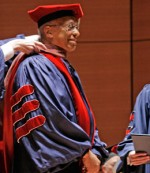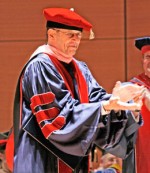Title
The graduating class of 2009 was treated not only to a bright, balmy afternoon on Friday, May 22, the day of Juilliard’s first commencement ceremony in the newly-renovated Alice Tully Hall, but to a commencement address by one of the School’s most illustrious alumni, actor Laura Linney, who, along with choreographer and dancer Donald McKayle, jazz legend and entrepreneur Quincy Jones, composer Steve Reich, soprano and opera director Renata Scotto, and performing artist and philanthropist Haruhisa Handa, received an honorary doctorate that day. Here is a transcript of Ms. Linney’s speech, which can be heard on the Juilliard multimedia gallery.
Body
President Polisi, distinguished guests, faculty, family, friends, and—most importantly—the Juilliard graduating class of 2009: Thank you. I am so extraordinarily proud and honored to have been invited to help you mark this milestone, this commencement of your lives as performing artists outside of this very special place called Juilliard. Can you believe it? Did you ever think this day would come? What an exciting day. What a very big day this is. After intense years of arduous study and exploration, you are today suspended between an ending of one part of your lives and the beginning of another.
I welcome this opportunity to congratulate all of you on a truly remarkable accomplishment—because graduating from Juilliard is a tremendous accomplishment. It is also a unique privilege not to be brushed over lightly ... it is something you can and should be proud of the rest of your lives.
My invitation here today not only includes me in your celebration but also, in the process, selfishly allows me the opportunity to express a little gratitude. This moment gives me a chance to say thank you all over again to the faculty and fellow students who pushed, prodded, intimidated, and inspired me through the sometimes painful, often joyful Juilliard experience that I carry with me every day of my life. Nearly two decades later, I am more deeply indebted than I ever knew possible to those who have made The Juilliard School what it is. Juilliard changed me, and I know that it has changed all of you as well.
For those of you now saying goodbye to this place and to this chapter in your life, I hope you’ll take a moment to remember the many, many people who offered you something useful and good on your way through this school. Plenty of faces will come to you quickly and easily—the faces of people who knew how good you were, how far you could go, how much you could give, and how much you could take long before you did. As time passes, more faces will appear, more lessons will be remembered, more voices will make themselves heard.
As I look across row after row of these talented musicians and singers, I remember the strings, the brass, the percussion, and the heavenly voices that I once heard flowing down through the stairwells and up through the hallways of the third floor—the music that gave me heart on days when I really, really needed it. When I look at the dancers, I distinctly remember passing through some open space in the building and stumbling onto an impromptu rehearsal. I remember stopping, utterly transfixed, spying, to watch such strength and poise, and that fierce artists’ concentration. They would stop and pace the floor, jumping in and out of the music, unsatisfied ... I remember wishing I could watch them forever, suspended in an epiphany that I had just witnessed, and felt the power of dance, the transformative power of art in motion. It was one of the most beautiful things I have ever seen. It was also then that I sighed, and really understood why all the actors wanted to date the ballerinas!
When I look at the actors, I see the spirit, faith, and raw guts and discipline it takes to walk onto a stage—any stage of any size—to take your best shot at serving a writer and engaging an audience. And now there are playwrights at Juilliard, putting their words and ideas to the test in preparation for the task of giving the theater its purpose.
Many times over the years I’ve been asked what I consider my “big break.” The interviewer is always looking, of course, for an entertaining anecdote, for the name of a play or a film—or a famous director who once gave me “The Job.” I have always answered this question honestly and in exactly the same way: “My big break was getting into Juilliard.” The questioner always seems surprised to hear that, and I’m always puzzled (and I must admit a little irritated) that he’s so surprised.
But how could I expect him to know what Juilliard has done for me? How could he know about the tools we’ve been given and how valuable they are?
And now you have done more than get into Juilliard. You have now gotten out of Juilliard.
You are as prepared as a graduating artist can be. You have done the most you could do for yourself and for your craft before entering a world that has always been challenging to the arts and to its artists.
Musicians, actors, writers, dancers, singers—all of you are moving into a world ever ready to remind you that you aren’tin school anymore, a world that demands results quickly and cares very little about how you produce them. It’s true: You are not in school anymore. But now, the school is in you.
That means that the creative tools you have begun to cultivate inside Juilliard will guide you when you’re lost or exasperated, when you don’t know what you’re doing, when you feel alone, when everything is wrong. The lessons you have learned here and the ways of working you have developed here are always available to you, and they will always help you.
In the years since I left this place, I have learned to relish the challenge in translating a director’s demand for quick results into a working process that helps me deliver them.
I’ve learned to safeguard the study that John Stix, Eve Shapiro, Michael Kahn, Moni Yakim, Robert Williams, Liz Smith, Nancy Lane, Tim Monich, Brooks Baldwin, Pierre Lefèvre, Jane Kosminsky, Judy Liebowitz, Harold Stone, and Michael Langham and many others helped me experience. I keep the collective concentration I shared with every member of Group 19 as close to me as possible. They are all, students and teachers, an invisible army I take with me wherever I go.
I’ve also learned that only a fool fails to respect the gifts that she’s been given, the people who’ve given them, and thefellow artists on whom she depends. Respect and humility are the best defense we have against our own worst instincts.
But I’ve also learned that the most interesting artists are those who aren’t too afraid to fail. As the late great Jack Lemmon once said, “Failure seldom stops you. What stops you is the fear of failure.” You’ve made it this far by taking big chances. Don’t stop now. You will never achieve a deeper understanding of your work, or learn the tough lessons, if you are liked or comfortable all of the time.
So today, you head out into the world hoping to inspire audiences, to grow as an artist, and hopefully to earn a living. It’s worth remembering that though this school has given you many gifts, it didn’t give you talent. Talent is what you gave Juilliard—and this school, your teachers, and the students you have gone through this experience with are the better for it.
This place has given you some good ideas about how to work, about how to challenge yourself and others, about what matters and what doesn’t, and about which questions must be answered and how to answer them. Now you’re free to use your talent and this technique to make something entirely new. I hope you’ll think of that not only as a priceless opportunity—but as a responsibility, as well.
A blessing and a curse of being a Juilliard student or graduate is that no one, and I mean no one, knows what it is like to go to Juilliard unless you have gone to Juilliard. And likewise, no one will know what it is to graduate from Juilliard in 2009 except those of you in this room.
This is your time. I have no idea what you will encounter or what adventures you will face. What will happen in the world or the fate of the arts over the next decades. It is a mystery to all of us what your journey will be. It is yours and yours alone. And how you face the challenges ahead are up to you, your character as a human being, and your creativity.
But there are some things I can wish for all of you:
One wish is that on the days when you need it, you’ll remember some bit of wisdom that some teacher at Juilliard once gave you, something that stuck in your head because you didn’t understand it and that it will suddenly seem crystal clear and endlessly useful.
I hope you’ll keep a connection with some of the people you have worked with here. You’ll be surprised to learn how deeply invested many of them are in your life as an artist. Regardless of how tough they seemed.
My most fervent wish for you is a vocation in the arts and not a profession.
I hope you’ll remember that no matter which art you practice there is no more valuable skill than the ability to listen carefully. Especially when you listen to the music, or listen to the text ... listen … they will guide you well.
I hope you’ll become an advocate for the arts—because the arts need your voice and deserve your loyalty.
I wish for you perspective when situations or people seem more important than they really are, and the ability to detect those people or events who have much to offer but don’t inherently draw your attention.
I hope that you never ever read your own reviews. Good ones or bad ones. It is not a critic’s job to tell you how to feel about your own work. That is your responsibility alone. Never allow anyone to tell you how to feel about your own work. Or limit your view of yourself or who you are.
I hope you live through your art in unexpected ways. That as citizens you will use the best part of you and what you have leaned to improve your neighborhoods and communities, that you will give what has been given to you.
I hope that you say yes more than no.
And that you never feel you have “made it” or “arrived.” What a ridiculous concept. That would be the antithesis of being in the arts, wouldn’t it?
I hope that you allow the largest part of yourself to remain a student. Now you have the freedom to be an unsupervised one, and the learning and growth that can come from your own guidance and dexterity and curiosity, mixed with the tools that are now at your disposal, is exhilarating and at a whole new level.
I hope you will be patient with yourself and the world as you transition into your “Non Juilliard” life. It is very different ... keep an open mind, your friends, and your sense of humor close by.
But most of all, I hope you’ll celebrate. Not just today. Not just at this graduation with your friends and family and teachers who are so deeply proud of you. I hope you’ll be celebrating for the rest of your lives—because, after all, celebration is now your profession. God bless, good luck, bon voyage! My heartfelt congratulations to each and everyone of you.










